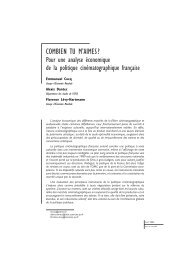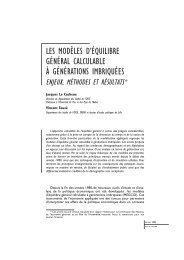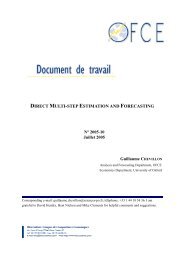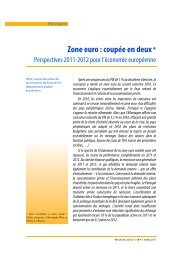N° 2005-09 Juin 2005 Guillaume Daudin* Jean-Luc Gaffard ...
N° 2005-09 Juin 2005 Guillaume Daudin* Jean-Luc Gaffard ...
N° 2005-09 Juin 2005 Guillaume Daudin* Jean-Luc Gaffard ...
Create successful ePaper yourself
Turn your PDF publications into a flip-book with our unique Google optimized e-Paper software.
Relocation: What Matters? Competition or/and a New Policy MixIn this perspective, what is at stake is not deindustrialisation and relocation per se, butthe creative destruction process, which is behind the scene, and how to deal with it. We havejust seen that innovation or any change that implies a breaking down in industrial and marketstructures and the appearance of sunk costs has implications on the spatial distribution ofeconomic activities. Thus, spatial as well as industrial issues are mainly co-ordination (largelydomestic) issues related to the distortions in the structure of productive capacity and the sunkcosts associated with it. Openness and the emergence of new countries in the internationaltrade do not create difficulties per se. They create difficulties insofar as local disequilibria,which result from changes in the international environment, are not correctly dealt with. Theymay even be a means for ensuring a better co-ordination because of the enlargement ofmarkets.Briefly, market disequilibria and distortions in the productive capacity that necessarilyemerge call for local co-ordination of economic activities, which cannot amount to simply reestablishingcompetitiveness by reducing production costs or creating niches for newproducts. Co-ordination should consist in creating the conditions for firms to deal with sunkcosts, which are the unavoidable consequence of structural change. Helping the constitutionof networks, supporting co-operation agreements, facilitating access to financial and humanresources are elements of the required policy mix that include competition, regulation, orbanking policies.Thus there is no fatality of a core – periphery pattern. Indeed, increasing returns andproduct differentiation make it possible to have a huge increase in intra-industry internationaltrade. Thus, the extension of trade may take place without a sizeable relocation of productiveresources or income distribution effects, but with a local reallocation of these resources. Alldepends on the way co-ordination issues are dealt with, within economies and betweeneconomies. The basic idea is that growth and the realization of increasing returns can takeplace in different countries preserving their heterogeneity, but without creating moreinequality among them. Provided, though, that we look at trade liberalization, growth andinnovation in the light of the interpretation of evolution process that focuses on co-ordinationconditions that cannot be reduced to the market forces.4. Relocation and the evolution process: the role of tradeAny breaking-up in a pre-existing industrial and spatial structure results indisequilibria between supply and demand of final product at each moment of time and over71








